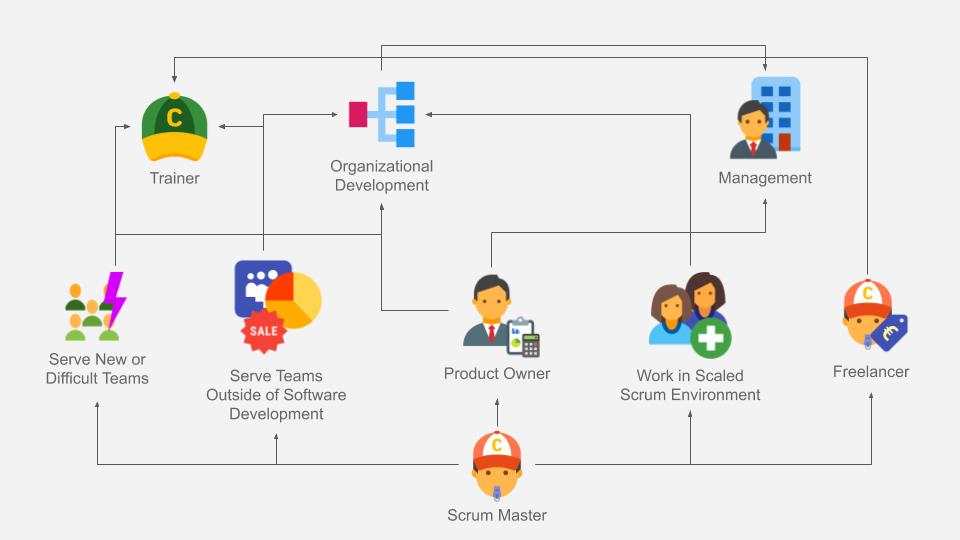Although there are no clearly defined career paths for Scrum Masters, there are many options for a long, sustainable Scrum Master career. In this article, you will learn about 8 career opportunities for Scrum Masters. Understand where you are in your career right now and what your next step could be.
Hierarchical Career Paths Do Not Apply
Many job positions have clearly defined hierarchical career paths like software developers. Here is an example of a career path:
Developer – > Lead Developer-> Architect -> Development Team Lead -> Development Manager -> CTO
If you scan and analyze Scrum Master job descriptions, you will identify a lot of responsibilities and todos which are not part of the Scrum Master role. That’s because the Scrum Master role is still new for a lot of companies, especially for their HR departments. Therefore there are no clearly defined career paths for Scrum Masters.
The example career path above of a software developer is a path along the hierarchy of a company. Hierarchical career paths have two backs:
First, not everybody in the company will be able to become the Development Manager. You do not need a lot of Development Managers. This limits the individual’s career options.
Second, if you get stuck in one position, the only thing left is switching to another company to climb the next step on the corporate ladder.
Have you ever read the following sentence in agile forums, blogs, and comments?
The Scrum Master’s job is to make themself obsolete
Let’s recap:
- There are no clearly defined career paths for Scrum Masters.
- Hierarchical career paths limit your career options.
- If you do a great job as a Scrum Master you might risk being made redundant.
While the third quote is bullshit (read here to understand why the Scrum Master role is a great choice for a long and successful career) the other facts are still present, at least in your mind. Let’s have another view on Scrum Master career options.
Scrum Masters Have Options
As a Scrum Master, you are serving your Development Team, your Product Owner, and your organization. That means you are working closely with technical people, product people, and managers. This is in your advantage and provides lots of options (rather than pre-defined paths) for your career:

1. Serve New or Difficult Teams
Usually, Scrum Masters start with one team. After a while, the team takes on more responsibility and works self-organized. You as a Scrum Master don’t need that much time to serve the team.
At that point, a good Scrum Master may face new challenges with an additional team. For example, you as a Scrum Master can serve another team having difficult personalities or unrealistic delivery expectations.
2. Serve Teams Outside of Software Development
As most Scrum teams develop software, more and more companies are trying to bring other parts of the company into an agile environment. These departments and teams need support, maybe not a Scrum Master, but a person who knows and lives agile principles. As a Scrum Master, you have the opportunity to expand your knowledge and experience in other frameworks, for example, Kanban. Many teams in marketing, HR, and sales can benefit from the application of agile values and principles in their daily work.
3. Work in Scaled Scrum Environment
When you start your Scrum Master career, often you are working with one team which works on one product. The vast majority of products are so big and complex, that more than one team is working on the same product in a scaled Scrum setup. Cross-team collaboration brings in new challenges and it is a great way to take the next step and gain experience as a Scrum Master.
4. Product Owner
During your work as a Scrum Master, you get familiar with the product and industry. While some Scrum Masters love the process and the way to find opportunities for improvements, there are Scrum Masters who like to build something and improve products.
The switch to a Product Owner role is a natural and common option for Scrum Masters to expand their skills and experience in agile environments.
5. Organizational Development
The more your company introduces Agile and Scrum in your company, the more work is required to remove impediments on the organizational level. There might be changes to the organizational structure of the company and your knowledge of working with teams as Scrum Master can help to create new teams and drive the agile transition forward.
6. Management
More or less you as a Scrum Master work closely with managers, especially when your team faces a lot of impediments regarding the organizational structure. You learn and understand the problems and work of managers. With your knowledge and experience in conflict solving, collaboration, and organizational impediments you can be a great benefit for the company as a manager.
7. Trainer
During your daily work as a Scrum Master, you are already training your team in collaboration and agile methods and techniques. Scrum is still a thing and it is still very new for some companies. Working as a Trainer is another option you can strive for in your career progression.
8. Freelancer
Working as a Scrum Master freelancer might be another option for you. As a freelancer, you work with different companies from a range of industries. You can work in all areas described above. In one project you may serve one team, in another project you may serve multiple teams combined with training employees. If you are already starting as a Scrum Master, this might not be an option for you, not yet. Companies hiring freelancers to get experts in their respective fields. If you gained experience this might be an option for your career in agile environments.
Where Are You in Your Scrum Master Career?
A Scrum Master has options to create a long and successful career. Traditional mindsets about career progression do not apply. But this is to your advantage. With knowledge and experience, you can transition to a wide range of positions.
Are you looking to change careers?

